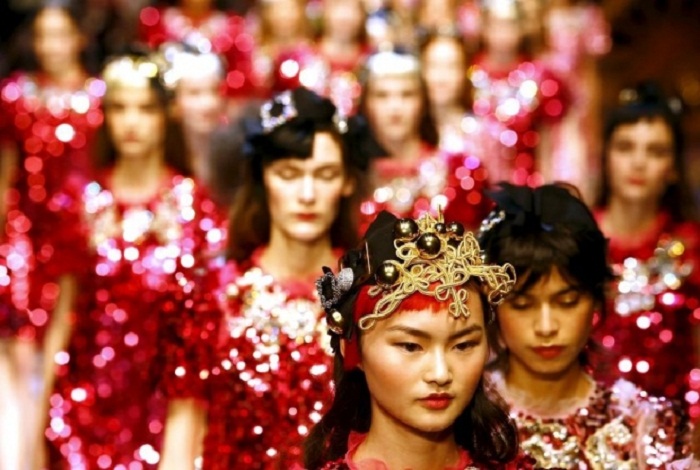With the tone set by invitations which, on opening, played "A Dream Is A Wish Your Heart Makes," from Disney`s 1950 animated version of "Cinderella", this was a celebration of true and enduring love in all its forms.
The catwalk backdrop featured a recreation of Cinderella`s bed, a golden horse and a tapestry featuring representations of Domenico Dolce as a man and Stefano Gabbana as a woman.
"The princess was walking in the woods accompanied by Domenico Dolce and Stefano Gabbana when they met a handsome prince, riding his white horse ...and they lived happily ever after ... " read the script.
Fable references abounded, commencing with the giant pumpkin and Cinderella-inspired mirror at the entrance to the converted cinema that staged the show.
The graffiti on the mirror asked, "Who is the most beautiful? YOU!" - just perfect for a self-affirming selfie.
As ever with D&G, all was not quite as it appeared. The Prince Charming in this show was a girl sporting a bolero jacket over cropped pants, one of a number of outfits with a 19th Century cavalry feel about them.
Away from the military and piratical elements, dresses featured embroidery inspired by the mice that stitched Cinderella`s ball gown, the apple in Snow White and the clock in Alice in Wonderland.
Many of the props used were borrowed from sets belonging to Milan`s La Scala opera house with the help of the venerable institution`s own set designer Angelo Scala.
`A different attitude`
The idea was "to evoke a dream-like feeling in every woman," the designers said.
"Every woman wants to be a princess deep inside, albeit a modern one, a princess that instead of waiting in her castle for her prince to come and give her the kiss of true love, is independent and looks for her prince herself."
In developing their vision of a new generation of princesses, D&G said they had been particularly inspired by Disney`s 2013 hit "Frozen", a film in which the main character Elsa`s magical powers are rejected in a way some have interpreted as an allegory for society`s treatment of homosexuals.
"The new girls are not only independent, but have a personal point of view: first of all, they consider themselves as individuals; what makes them different is their attitude," the designers said.
The show culminated in a glittering finale of 95 models dressed in mid-thigh mini-dresses covered in fuchsia, silver and pink sequins and crystals.
Italy`s debate over civil unions has proved bruising for two men who, particularly because of Dolce`s roots in socially conservative Sicily, have been pioneers as prominent gay men in Italian public life.
Dolce caused a furore last year by saying in an interview that he did not like the idea of gay couples seeking to have children through surrogacy and that he felt every child should have a mother and a father.
Gabbana disagreed but defended his former life partner`s right to his opinion, leading to accusations of betrayal from some inside the gay community and brand-damaging criticism from the likes of Elton John and Victoria Beckham.
The duo last month unveiled a line of handbags and T-shirts celebrating diverse family models in what some interpreted as an attempt to undo the impact of last year`s spat.
As things have turned out, Dolce and Gabbana`s different perspectives on gay parenthood were mirrored by broader Italian society`s reservations about allowing gays to adopt the biological children of their partners.
The bill which got through the Senate and now has to be approved by the Chamber of Deputies approves legal partnerships but does not ensure equal adoption rights for homosexuals.
Recent polls suggest 70 percent of Italians think the parliamentary fudge was the right outcome.
More about:
















































